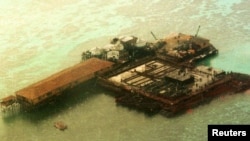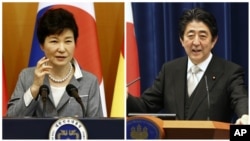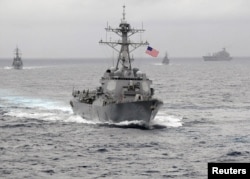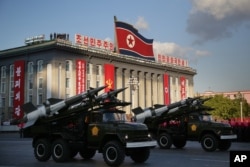Even though this weekend’s trilateral summit with China, Japan and South Korea and the bilateral between Japanese Prime Minister Shinzo Abe and South Korean President’s Park Geun-hye are the first such high level talks to occur since 2012, expectations are low that anything of substance will result.
Foreign ministry officials from the three participating Asian powers met Thursday in Seoul to work on the summit agenda. Deputy Minister for Foreign Affairs Sugiyama Shinsuke represented Japan at this preparatory session.
“In three days time we are to materialize our three country summit meeting after a three and a half year absence of doing that,” Shinsuke said.
But the Japanese deputy minister declined to comment on any issues of substance regarding the upcoming talks. Shinsuke even refused to acknowledge if potentially controversial issues will be on the agenda, such as China’s aggressive behavior in the Pacific or Prime Minister Abe’s continued refusal to apologize for past war crimes committed by Japan’s military.
President Park Geun-hye will hold bilateral talks with Chinese Premier Li Keqiang in Seoul on Saturday. On Sunday Prime Minister Abe will join the talks for the first trilateral leaders summit among these regional powers since 2012.
Political science professor Hosaka Yuji from Seoul’s Sejong University says the fact that China’s head of state President Xi Xinping is not attending the trilateral himself is in part because Beijing sees Tokyo and to a degree Seoul as junior partners to the United States.
“I think China did it that way even though the level is not right,” said Hosaka.
Tensions with Japan
Tensions over conflicting claims to islands and growing anger at Japan’s seeming unrepentant attitude over its wartime past had led to the suspension of these regular high-level talks on regional security and economic development.
On Monday, the Japanese prime minister and South Korean president will meet for the first official bilateral between these two leaders since they each came to power.
Park had refused to meet with Abe until he offered a “sincere apology” to the thousands of Asian “comfort women” forced into prostitution and sexual slavery by Japan’s military during its colonization of much of Asia until the end of World War II.
But recently Park indicated she would overlook Abe’s omissions and focus instead on his promise to uphold past Japanese apologies.
But Seoul continues to press this issue, while Tokyo continues to resist. Abe has articulated condolences for the atrocities that occurred during WWII. It seems unlikely that at the bilateral he will offer the stronger and direct apology that Park has demanded.
S. China Sea
If Washington is looking for military allies Tokyo and Seoul to speak out at the summit against China’s assertive policy on the South China Sea, it may be disappointed.
Washington recently sent a warship near disputed South China Sea islets and reefs claimed by Beijing to protect the freedom of navigation in the disputed area.
Beijing, which also claims jurisdiction over the 12 nautical miles (20 kilometers) of territorial waters around the islands, protested the incident as a provocation.
Tokyo has sided with Washington against China’s assertive and aggressive moves in the South China Sea.
Japan and China have their own conflicting claims to islands in the East China Sea, called the Senkakus in Japan and the Diaoyu in China.
But Seoul has been tepid in its response, urging all sides to resolve their differences peacefully. Kim Heung-kyu, the director of the China Policy Institute at South Korea’s Ajou University says South Korea will likely try to avoid this contentious issue at the summit.
“In the conflict between the United States and China, South Korea prefers to play a role as a negotiator or proposer for stability, peace and cooperation rather than boosting the conflict by standing on one side,” said Kim.
Nuclear program
China, Japan and South Korea all agree that North Korea must end and dismantle its nuclear weapons program, but don’t all agree that sanctions and pressure alone will accomplish that goal. Beijing has supported sanctions against Pyongyang for past nuclear tests, but has recently persuaded North Korea to refrain from further provocations, at least for now.
In response, China is increasing economic engagement and trade with the impoverished North; at the summit it may press the other northeast Asian powers to join in more outreach to North Korea to encourage more positive behavior from the Kim Jong Un regime. Washington’s hardline position is that Pyongyang must halt its nuclear program before it will enter into formal international talks to ease sanctions.
Youmi Kim in Seoul contributed to this report.








